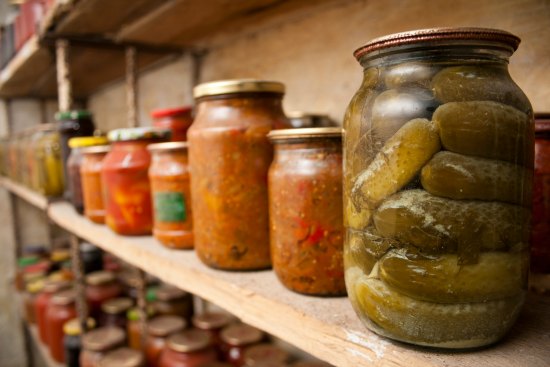Extreme winter storms have the capacity to knock a home off the grid for a given amount of time. Have a plan for any situation, and maintain a diverse supply of survival foods so you are ready for anything this upcoming winter.
Building an emergency pantry is one of those lifelines that takes time, financial resources, and planning to make it fully functional. Ideally, you will want to store shelf-stable foods that your family normally consumes, as well as find foods that are multi-dynamic and serve many purposes.
So, what does a well-stocked food pantry look like? In a previous article on how to stock a prepper pantry, Tess Pennington wrote, “Over the years, I have made recommendations for the best types of foods to put in your pantry, how to save on emergency food stores by learning how to can and dehydrate your own food sources, as well as providing the best rules to go by when creating an emergency food pantry. Ideally, you want the food you put in those coveted pantry spots to be versatile and serve many uses. I like to start with shelf-stable basics like wheat berries, rice, an assortment of beans, dry milk powder, peanut butter, drink mixes, etc., and then add on to my pantry with home canned and dehydrated foods. This creates layers of different types of short and long-term food stores and gives me more functionality in my pantry. “ As well, just add water meals like soups and pastas are super easy and sanity savers during hectic times when you are off the grid. Along those lines, comfort foods such as tea or coffee or your child’s favorite snacks can also do double duty in providing some normalcy to a time when kids may be feeling the stress of the situation.
Based on all of that advice, here are 25 must-haves for the prepper pantry, especially if you are just beginning!
1. Canned fruits, vegetables, meats, and soups
2. Dried legumes (beans, lentils, peas)
3. Crackers
4. Nuts
5. Pasta sauce
6. Peanut butter
7. Pasta
8. Flour (white, whole wheat)
9. Seasonings (vanilla, salt, pepper, paprika, cinnamon, pepper, taco seasoning, etc.)
10. Sugar
11. Bouillon cubes or granules (chicken, vegetable, beef)
12. Kitchen staples (baking soda, baking powder, yeast, vinegar)
13. Honey
14. Unsweetened cocoa powder
15. Jell-O or pudding mixes
16. Whole grains (barley, bulgur, cornmeal, couscous, oats, quinoa, rice, wheat berries)
17. Nonfat dried milk
18. Plant-based oil (corn oil, vegetable oil, coconut oil, olive oil)
19. Cereal
20. Seeds for eating and sprouting
21. Popcorn (not the microwavable kind)
22. Instant potato flakes
23. Packaged meals (macaroni and cheese, hamburger helper, Ramen noodles, etc.)
24. Purified drinking water
25. Fruit juices, teas, coffee, drink mixes
You should also take into consideration healthy choices in the pantry too. Health is true wealth, and foods like nuts, protein powders, canned broth, and beans or lentils are awesome choices! I personally stock up on canned organic coconut milk. It’s an excellent option for creamy dishes if you are vegan or dairy-free. Giving your body the nutrition it needs during emergencies will give you more energy and lots of nutrition when you need it the most. Here is how I make a dairy-free creamy white bean soup. I use a crockpot, but this could be made on a stove:
Canned unsweetened full-fat coconut milk can also be used to make an excellent vegan alfredo sauce! My husband and son (who are not required to be dairy-free) absolutely love it too! So stock up on the things your family can use and will go through, especially if they are healthy options!
So don’t be unprepared for the next disaster, whatever it may be. What foods do you add to your pantry for winter?
Related Articles:
11 Emergency Foods That Last Forever
Five Family Friendly Food Pantry Organizing Tips Anyone Can Do
5 Ways to Stretch Your Meals SHTF Style
Food Pantry: Take Care of Your Basic Needs
72 Hours Without This Will Kill You: Survival Water Fundamentals
This article was originally published at Ready Nutrition™ on November 22nd, 2021







